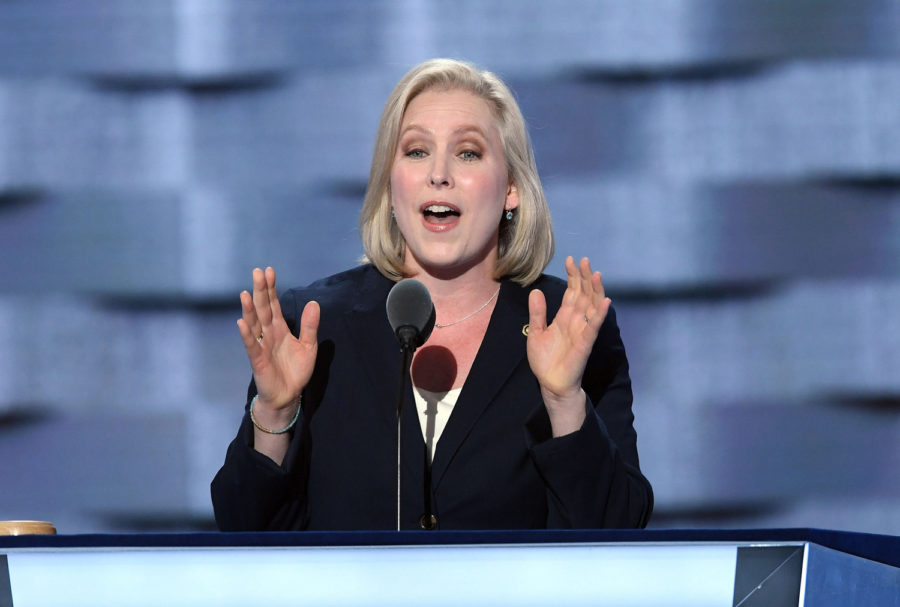Opinion | Gillibrand’s ‘Women-Plus’ campaign is exactly what we need right now
New York Sen. Kirsten Gillibrand speaks during the first day of the Democratic National Convention on July 25, 2016, in Philadelphia.
February 21, 2019
Sen. Kirsten Gillibrand, D-N.Y., has long been a champion of women’s rights. The most consistent thing about her 10-year career in the Senate has been her unapologetic commitment to fighting for women. Now that she is running for president in 2020, she continues to embrace her feminist values by running a “women-plus” campaign.
This means that Gillibrand is choosing to focus on issues that are female-focused, and she isn’t shying away from her labels as a woman and as a mother. Instead, she is choosing to run with these aspects as central pieces of her campaign. This could prove to be the perfect campaign strategy for her, and one that the American people need to witness — regardless of whether or not she gets the nomination.
Gillibrand’s unflinchingly feminist campaign may be unprecedented, given that only one female presidential candidate has ever received the nomination of a major political party. Without any previous female candidates to inspire campaign strategies, Hillary Clinton’s communications director Jennifer Palmieri said in a 2018 interview with The Guardian that the team ran her campaign the same way they would have run it with a male candidate. As a result, Clinton came off as inauthentic at times.
Just because this is a new thing, does not mean it is a bad campaign strategy. In fact, it may prove to be a great one. Authenticity is something that voters respond to, and Gillibrand has proved throughout her entire political career that she is willing to fight for women’s rights — even when it isn’t the popular thing to do.
Gillibrand was the first Democrat to call on former Sen. Al Franken, D-Minn., to resign amidst allegations of sexual assault. Eight women came forward to accuse Franken of sexual harassment, and even though Franken was a star in the Democratic party, Gillibrand put her personal values above party ones to call for his resignation. It was a bold move, and one that Gillibrand faced a lot of backlash for — even amongst her own party.
“When I called on Al Franken to resign, I paid a price,” said Gillibrand in an email sent out by her presidential exploratory committee. “I made a lot of establishment Democratic donors angry, and they launched attacks in the press. Everyone had the same facts — there were eight credible allegations of sexual harassment and abuse that were corroborated in real-time — and I refused to remain silent.”
This was not the only time that Gillibrand spoke out against a member of her own party when it came to sexual misconduct. She also said in November 2017 that given the context of our current time and the #MeToo era, President Bill Clinton should have stepped down after his sexual relationship with a White House intern.
Clinton campaigned for Gillibrand, and some called her hypocritical for criticizing him as a result of this. However, Gillibrand would only be a hypocrite if she did not criticize Clinton. Coming out and criticizing a member of one’s own party for sexual misconduct as well as those across the aisle is far from hypocritical. It’s a very consistent and brave thing to do.
Gillibrand called for President Donald Trump to resign as well amid his own sexual assault allegations in December 2017. In response, he tweeted a message criticizing her for speaking out against Clinton and implying she would do “anything” for campaign contributions.
“You cannot silence me or the millions of women who have gotten off the sidelines to speak out about the unfitness and shame you have brought to the Oval Office,” Gillibrand tweeted in retaliation.
Gillibrand has proven in these instances that she is unwilling to back down and take the easy way out when it comes to believing survivors and holding men in power accountable.
“I think it’s important to know when you’re wrong and to do what’s right. And I will do what’s right, and I will fight for what’s right, and I don’t back down from those fights,” Gillibrand said in January at a press conference after she announced her presidential candidacy.
This is something that has been reflected in the other issues that Gillibrand has fought for in the Senate. She’s spent her career fighting for bills that would help to protect women who face sexual assault on college campuses, in the military and on Capitol Hill itself. She has also introduced legislation dealing with paid family and medical leave, equal pay and affordable child care, all legislation that benefits women and families. Gillibrand has made these issues integral pieces of her campaign.
She has also spent years fundraising for women running for office through a political action committee that she created called Off the Sidelines. Gillibrand started this PAC due to her belief laid out on its site that “if more women are elected to office and have a seat at the decision-making table, the outcomes will be better.” So it is unsurprising that Gillibrand is not shying away from the feminist label in her presidential campaign.
While we may not have seen a candidate use this campaign strategy before, it can still be a great one that sets her apart. Women made up 52 percent of the voters in the 2018 midterm elections. As a result, a historic number of women were elected to congress.
Women made up 58 percent of the voters in the Democratic primary in 2016, and they chose a female candidate to represent the Democratic party. The candidate who wins the 2020 Democratic primary election will have to be one that appeals to female voters.
“Traditionally in New Hampshire, all things being the same, women do have an edge in the Democratic primary,” New Hampshire Democratic Party Chairman Ray Buckley said, according to tweet from Hanna Trudo, a political reporter covering the 2020 Democratic election. Gillibrand’s strategy of running a “women-plus” campaign could appeal to these voters and potentially win the nomination for her, especially because she has the record and the authenticity to back up her claims.
In 2020, we need to elect a president who will combat all of the hate that Trump and his base have been spreading the past few years. We need a president who can stand up for what is right, whether it is politically convenient to them or not.
“And I have the record to show I stand up for what’s right. I do what’s right even if it costs me everything,” Gillibrand said when speaking to voters in Iowa earlier this week. “That’s why I’m running for president of the United States.”









